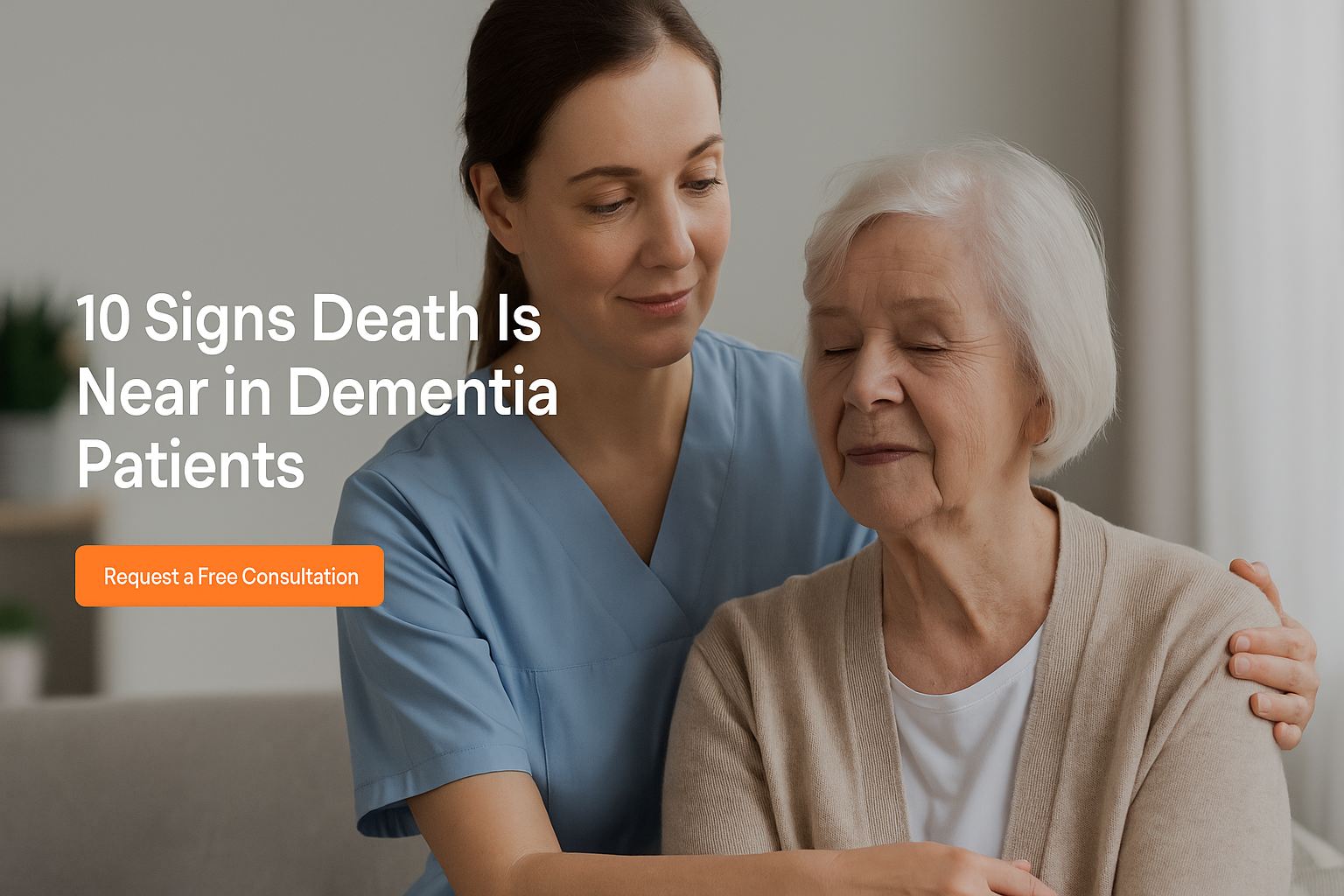Watching a loved one go through the final stages of dementia—whether it’s Alzheimer’s, frontotemporal dementia, or another form—is deeply emotional and overwhelming.
Recognizing the 10 signs death is near in dementia patients can help families prepare emotionally, practically, and medically. This guide covers these signs, explains the 7 stages of frontotemporal dementia before death, and shares 20 things not to say to someone with dementia—to help you communicate with kindness and compassion.
Understanding the Final Stages of Dementia
Dementia is a progressive neurological condition. In the terminal stages, the brain gradually loses control over essential functions such as swallowing, breathing, and regulating body temperature. Especially in frontotemporal dementia, decline can be faster than in Alzheimer’s. Knowing what to expect helps families provide comfort and dignity during the final stage of life.
10 Signs That Death May Near in Dementia Patients
- Increased Sleep and Unresponsiveness
Patients may spend most of the day asleep, responding little to voices or touch. - Difficulty Swallowing and Eating
As swallowing muscles weaken, patients may refuse food, lose weight rapidly, and risk dehydration. - Labored or Irregular Breathing
Breathing may become shallow, pause between breaths (Cheyne–Stokes breathing), or produce gurgling sounds. - Decreased Mobility
Patients often become fully bedbound, unable to sit or stand without support. - Changes in Skin Color and Temperature
Hands and feet may feel cold; skin may look mottled or bluish due to reduced circulation. - Loss of Bladder and Bowel Control
Incontinence becomes common as muscle control declines. - Agitation or Restlessness (Terminal Agitation)
Some patients show sudden distress, pulling at clothes or sheets; palliative medication may ease discomfort. - Withdrawal from Social Interaction
Even once-social individuals may stop talking or acknowledging loved ones. - Lowered Blood Pressure and Heart Rate
Vital signs drop gradually; hospice teams often monitor and explain changes. - Loss of Consciousness
In the final hours, patients may become fully unconscious before passing peacefully.
What are the 7 stages of Frontotemporal Dementia?
- Mild personality and behavior changes
- Growing apathy and reduced empathy
- Language and speech difficulties
- Trouble planning, making decisions, or managing daily life
- Loss of independence and neglect of personal hygiene
- Motor issues such as tremors or muscle stiffness
- Full dependency, loss of awareness, and signs that death may be near
Each stage varies in length; some progress quickly, others more slowly.
Compassionate Hospice & Dementia Support When You Need It Most
Watching for these signs in dementia patients can be emotionally overwhelming. Families often wonder how to ensure comfort, dignity, and specialized care for their loved one during these final stages. At Health at Home, we don’t just see dementia care as a medical service — we see it as a commitment to compassion, respect, and personalized support. We proudly serve families across Broward, Indian River, Martin, Palm Beach, and St. Lucie Counties, delivering high-quality home care that helps your loved one remain where they feel safest: at home.
Why Families Choose Health at Home for Dementia & End-of-Life Care
Customized dementia care plans built around each client’s stage of dementia, personal history, and family preferences.
Specialized memory care to keep clients engaged, comfortable, and emotionally supported, even as cognitive abilities decline.
Compassionate personal care—including bathing, dressing, feeding assistance, and mobility support—always delivered with dignity.
Medication reminders and coordination to ensure safety and reduce family stress.
Emotional support and companionship to help ease loneliness, agitation, and anxiety.
Guidance for families, including help recognizing late-stage signs and planning for hospice or palliative care.
Our trained caregivers and care coordinators stay by your side, providing peace of mind and helping families focus on what matters most: meaningful moments together.
Navigating the Final Stages: You’re Not Alone
As the disease progresses, many families experience anticipatory grief—a deep sense of loss even before their loved one passes. At Health at Home, we offer more than daily care: we offer guidance, emotional support, and resources like caregiver counseling and local support groups to help you cope. With decades of experience in Alzheimer’s, frontotemporal dementia, and advanced dementia care, we understand the challenges families face. Our mission is to make these final months or weeks as peaceful and comfortable as possible—for your loved one and your entire family.
Get Personalized Dementia Care & Peace of Mind Today
If your loved one is showing late-stage dementia symptoms—or you simply want proactive, specialized care—contact Health at Home today. Let’s create a custom care plan that:
Maintains dignity and comfort
Supports your family emotionally
Helps your loved one age in place, safely and peacefully

Frequently Asked Questions About Dementia and End-of-Life Care
1. What does dementia mean?
Dementia is a progressive condition that affects memory, thinking, and daily functioning. It includes diseases like Alzheimer’s and frontotemporal dementia, and gradually impacts independence and quality of life.
2. What are the signs dementia is getting worse?
Signs may include increased confusion, difficulty speaking, changes in personality, and trouble with everyday tasks. Families might also notice balance problems or less recognition of loved ones.
3. How long can someone live with dementia?
Life expectancy varies widely, but many people live 8–10 years after diagnosis. Some may live only a few years, while others can live more than a decade, depending on health and dementia type.
4. Do dementia patients know they are dying?
In late stages, patients usually aren’t fully aware they’re dying due to cognitive decline. Still, they may sense changes and respond to gentle touch, familiar voices, and comfort.



